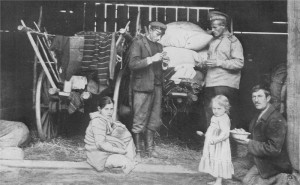In Peter Gatrell’s article, Displacing and Re-Placing Population in the Two World Wars: Armenia and Russia, he argues that the two ethnic groups sought protection both Post-World War I and II in order to establish the legitimacy of their state; however, the Armenians supported Russian “protection” while the Poles chose to abandon their homeland because of ideological differences. Gatrell is a Professor of Economic History at the University of Manchester in the U.K. His specialty is analyzing the economic influence of refugees and their movement after both World Wars.
What Gatrell keyed in on in the article but did not specifically mention is larger state’s influence on the movement of refugee and migrant groups based on ethnicity. The Soviet influence on both states is critical to understanding how well each ethnic group functioned within its own nation-state: Poland dealing with a complex egalitarian relationship, while Armenia relied on Russia for the creation and establishment of their “republic”. The implications that Gatrell’s piece has for modern day politics is astonishing to me. How do we deal with the refugee crisis in regards to international politics, because like the article states, while each group had their “state”, there were many issues that they struggled with because of their benefactor’s own political agendas.

